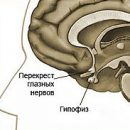The function of the thyroid gland during pregnancy changes due to the hormonal perestroika of the body. In the regions with insufficient iodine consumption, the prevention of diseases is the most important stage, since pregnancy and childbirth in women with thyroid pathology are accompanied by a high risk of developing complications.
Content
Changes in the thyroid gland during pregnancy
 During pregnancy, the function of the thyroid gland is subject to certain adaptation changes. Under the influence of estrogen, the synthesis of thyroxins-binding globulin in the liver is activated, and therefore the overall concentration of thyroid hormones in the blood increases, and the level of free (biologically active) - remains unchanged. Relative hormonal and iodine deficiency develops due to the reinforced binding of thyroid hormones with protein in the placenta, the transition of iodine into the fruit and the loss of it with urine - the trend towards the formation of goiter and the development of hypothyroidism arises. The factor acting preferably in the first trimester of pregnancy and leading to temporary stimulation of the thyroid gland is chorionic gonadotropin. This is due to the fact that the structures of the chorionic gonadotropin and the thyrotropic hormone are close, so chorionic gonadotropin can stimulate the function of the thyroid gland like a thyrotropic hormone. It is important to note that moderate increase in the level of thyroxine and lowering the thyrotropic hormone in the first trimester of pregnancy - physiological phenomenon and should not be considered thyrotoxicosis.
During pregnancy, the function of the thyroid gland is subject to certain adaptation changes. Under the influence of estrogen, the synthesis of thyroxins-binding globulin in the liver is activated, and therefore the overall concentration of thyroid hormones in the blood increases, and the level of free (biologically active) - remains unchanged. Relative hormonal and iodine deficiency develops due to the reinforced binding of thyroid hormones with protein in the placenta, the transition of iodine into the fruit and the loss of it with urine - the trend towards the formation of goiter and the development of hypothyroidism arises. The factor acting preferably in the first trimester of pregnancy and leading to temporary stimulation of the thyroid gland is chorionic gonadotropin. This is due to the fact that the structures of the chorionic gonadotropin and the thyrotropic hormone are close, so chorionic gonadotropin can stimulate the function of the thyroid gland like a thyrotropic hormone. It is important to note that moderate increase in the level of thyroxine and lowering the thyrotropic hormone in the first trimester of pregnancy - physiological phenomenon and should not be considered thyrotoxicosis.
It is assumed that the thyroid gland of the mother and the fetus is adjusted autonomously, but nevertheless partial transfer through the placenta of the hymens of the maternal thyroid gland is carried out. Mother's thyroid hormones play an important role throughout the pregnancy (for example, such as playing an important role to maintain pregnancy in early time). However, the normal level of thyroid hormones of matter and their transfer through the placenta in early pregnancy is especially important. The placental barrier is difficult to pass for thyroid hormones, but it easily misses iodides, thyroid immunoglobulins and thyreostatic drugs. It is the imbalance of thyroid hormones of mother during pregnancy, a leading role in violation of the psychoneurological development of children is given.
As a separate body of the thyroid iron, the fetus begins to function from the 12th week of intrauterine development. The hormones of the thyroid gland affect the growth of tissues and the formation of the central nervous system of the fetus.
At the level of tissues, thyroid hormones stimulate protein synthesis, regulate thermogenesis and energy balance, affect sexual development, menstrual function and ovulation, on various metabolic processes.
In the regions with insufficient iodine consumption, to which the vast majority of Russian regions include all pregnant women with the objectives of individual prevention, as well as for the treatment of diffuse non-toxic goiter, it is advisable to recommend the reception of iodine from the calculation of 150-200 μg per day. Currently, the issue of increasing the recommended preventive dose of iodine to 300 μg.
Receiving multivitamin preparations containing trace elements in T. C. 150 μg of iodine, can not be an alternative, as it does not fully ensure the need for a pregnant woman in iodine.
Pregnancy and childbirth in women with thyroid pathology are characterized by a high frequency of complications: early toxicosis, gestosis, chronic intrauterine fetal hypoxia, threat of abortion, increasing the risk of premature birth.
Primary hypothyroidism. Autoimine thyroiditis
The presence of primary hypothyroidism in women is one of the reasons for the violation of the reproductive function, and with an untreated hypothyroidism, the likelihood of pregnancy is extremely small.
In the hypothyroidism of a light degree or with its medication compensation, the occurrence of pregnancy is possible, and children are born healthy.
In women with autoimmune thyroiditis, even with the normal function of the thyroid gland, it is possible to transfer anti-random antibodies through the placenta and the associated risk of mental development of the fetus. Intrauterine hypothyroidism is accompanied by a slowdown in growth, demolition of heart rate, late development of osening nuclei. The duration of the hypothyroidism in the children of the first year of life is due to the period of removal of maternal antibodies from the blood and is usually one or three months. Its most significant clinical signs are pregnant pregnancy, a long-term non-joy of newborns, a big weight at birth.
Diagnosis of the pathology of the thyroid gland
To diagnose hypothyroidism in women during pregnancy, the most informative are: 
- Definition in blood serum level of free thyroxine and thyroglobulin
- Determination of the titer of antibodies to thyreoglobulin and thyreter peroxidase
- Identification of changes in the tissue of the thyroid gland with ultrasound examination
Since hypothyroidism can pose a threat to a pregnant and child, it is necessary to conduct adequate drug therapy. Selection of adequate dose L-thyroxine is carried out under the control of the level of free thyroxine and thyroglobulin. Women who is ill hypothyroidism and receiving replacement therapy, the dose of L-thyroxine during pregnancy should be increased by ≈ 30-50%.









